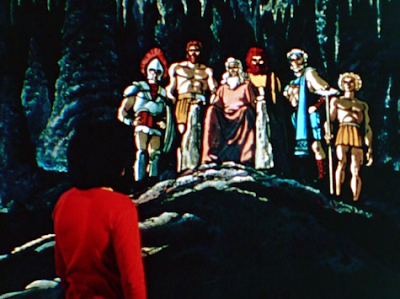As
a character, Captain Marvel first appeared in Whiz Comics in 1940 as a kind of
competitor for D.C.’s popular Man of Steel, Superman.
However, in the mid-1970s, Filmation’ Studios’
Lou Scheimer and Norm Prescott brought the superhero to life on TV for the
first time with the live-action Saturday morning series Shazam! (1974–1976).
The
title of the series -- which has caused
some confusion for a generation -- stems from an exclamation made every
week by adolescent hero Billy Batson.
When he shouts “Shazam!” aloud,
Billy is actually summoning a pantheon of Greek Gods and heroes, and calling for
their powers:
Solomon for wisdom.
Hercules for strength.
Atlas for constitution and
endurance.
Zeus for sheer power.
Achilles for bravery and skill.
and
Mercury for velocity or speed.
But
“Shazam!” as many folks mistakenly believe is not actually a character or
hero’s name or designation, only the utterance which transforms young Billy Batson into
the aforementioned Captain Marvel (Jackson Bostwick, John Davey).
In
the TV version of the comic book material, young Billy (Michael Gray) travels
around the United States in a Winnebago RV with an older teacher named, appropriately,
Mentor (Les Tremayne).
Batson
receives sage life advice from Mentor, but can also ask for the input of the Gods, a
Greek chorus, known as The Elders.
These
Elders are the aforementioned Solomon, Hercules, Atlas, Zeus, Achilles and
Mercury.
In somewhat non-traditional fashion, this Council of Elders is depicted in every episode in animated or cartoon form. Billy (in live-action, superimposed over the animation) stands before the assembled Elders in what appears to be a cave of some type. This is either a revolutionary blending of media for the time, or just a really bizarre, kooky 1970s touch.
In somewhat non-traditional fashion, this Council of Elders is depicted in every episode in animated or cartoon form. Billy (in live-action, superimposed over the animation) stands before the assembled Elders in what appears to be a cave of some type. This is either a revolutionary blending of media for the time, or just a really bizarre, kooky 1970s touch.
The
stories featured on Shazam! countenance very little violence as we reckon it today,
and the villains are never the sort who poses much of a challenge to Captain Marvel,
who possesses great strength and the ability to fly.
Instead, the stories focus on “kid” problems of the day, like bullies and peer pressure. This makes it a superhero series, frankly, in a kind of minor league. Shazam! has a great deal of value as historical nostalgia, but we'll be seeing too, how the stories hold up. (Hint: not very well).
Instead, the stories focus on “kid” problems of the day, like bullies and peer pressure. This makes it a superhero series, frankly, in a kind of minor league. Shazam! has a great deal of value as historical nostalgia, but we'll be seeing too, how the stories hold up. (Hint: not very well).
Shazam ran for three seasons on CBS, and I’ll
be blogging the first season over the next several weeks. The first year consists of fourteen half-hour long episodes, and these episodes originally ran from September through December of
1974.
I attempted to get through the entire series in 2013, and failed. So here I go again. I made it through Secrets of Isis, so I know I can get through Shazam.
I attempted to get through the entire series in 2013, and failed. So here I go again. I made it through Secrets of Isis, so I know I can get through Shazam.
Next
Week: “The Joyriders.”












Shazam will be interesting to see your thoughts on today. I remember watching it in the '70s. The blend of Live-action superimposed over animation used in Shazaam was also used to a major degree on the 1968-1969 NEW ADVENTURES OF HUCKLEBERRY FINN.
ReplyDeletehttp://www.tvshowsondvd.com/graphics/news3/TheNewAdventuresOfHuckleberryFinn_Complete.jpg
SGB